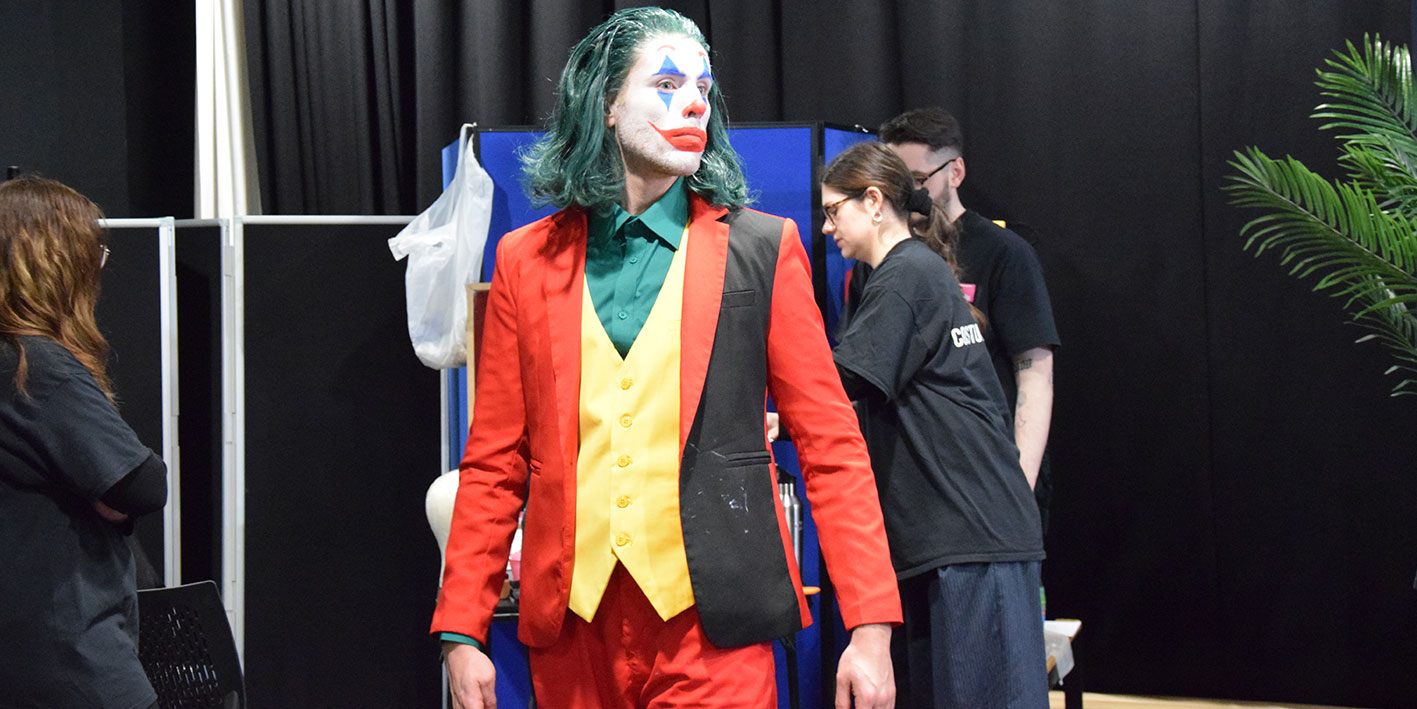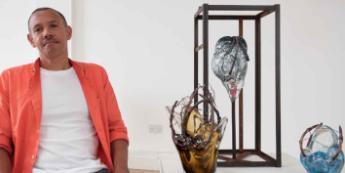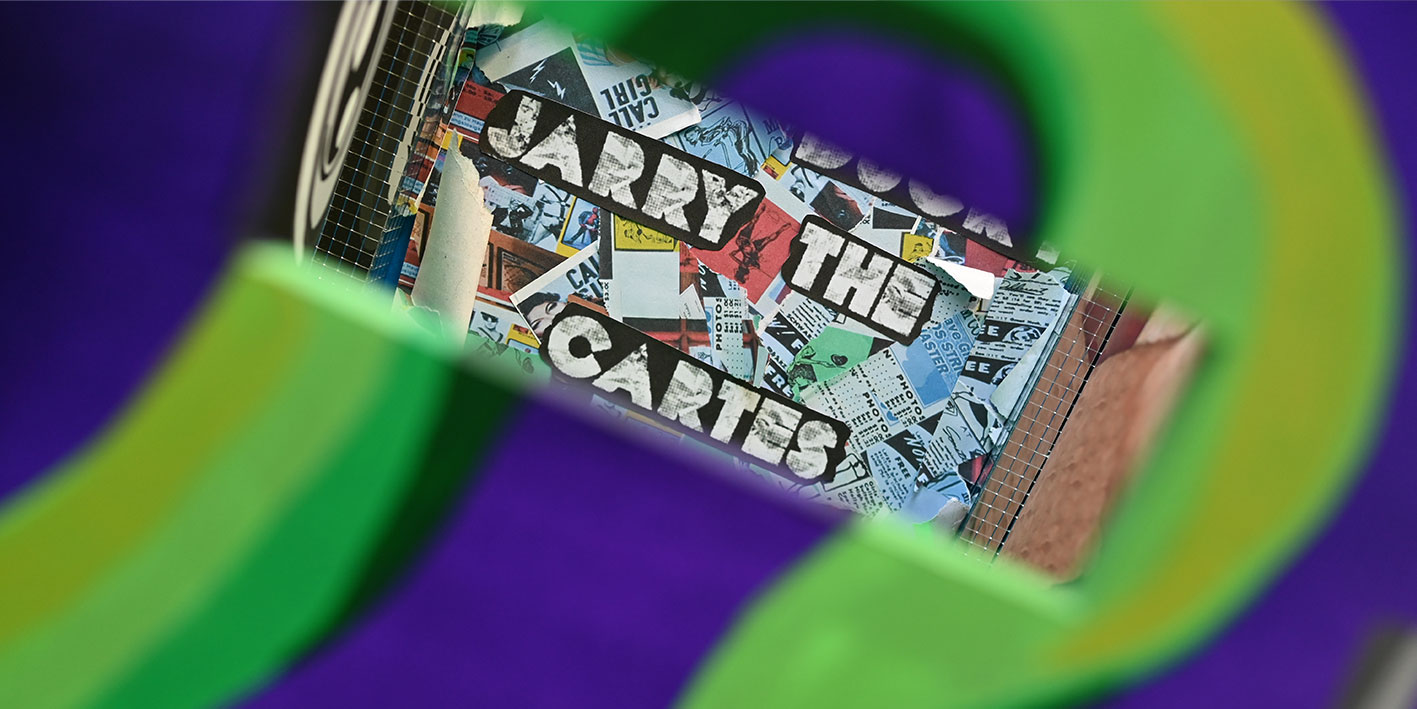
Plumber crafts a different narrative about black slavery
“When I arrived at the University, I was a blank canvas. I knew I wanted to tell a different story about slavery but not in the way it’s been done before. I wanted to change the narrative.”
A University of Wolverhampton arts student is crafting a different story about black slavery using glass and ceramics to create a different narrative – and he will be displaying his work at a prestigious exhibition in London later this year.
Chris Day, 52 from Lichfield who is married with three children, is a full time plumber who joined the University during clearing four years ago to study for a Bachelors of Arts degree in Design and Applied Arts at the University of Wolverhampton School of Art.
He secured a First Class Honours Degree and is now studying for a Master’s degree in the same subject.
Chris will be exhibiting his work, the result of his research into black slavery and the civil rights movement, at London Craft Week’s Vessel Gallery – an exhibition which celebrates outstanding British and international creativity. The festival brings together over 250 established and emerging makers, designers, brands and galleries from around the world.
His talent was spotted by a Vessel judge when Chris was selected as one of 74 artists out of 200 to enter the international 2019 British Glass Biennale exhibition held last year in Stourbridge.
His creative work has resulted in a series of personal pieces that discuss and investigate the treatment of black people in Britain and the United States. He also used materials derived from heating and electrical systems in reference to his ‘other’ career.
His research has focused on the history of the slave trade in the Eighteenth Century, with the copper cage in one piece representing the restriction of movement both physically and mentally, emphasising the complete control traders possessed over another human’s life.
Chris left school and worked in a variety of roles, first as an illustrator for marketing material with Derbyshire Life Magazine moving to baking biscuits in a factory before becoming an Engineering Apprentice and working with robotics whilst at the same time qualifying to become a self-employed plumbing and heating engineer.
Chris said: “When I arrived at the University, I was a blank canvas. I knew I wanted to tell a different story about slavery but not in the way it’s been done before. I wanted to change the narrative.
“I’d never thought about going to University and it was my wife who encouraged me to go to an Open Day and talk about my options. I’d never considered it, but I’d always loved art and did an Art O Level. It was something I always wanted to go back to and explore. But I was 48 at the time, with a mortgage and two kids.
“I can’t thank the University enough for inspiring me, they have nurtured me and they have instilled confidence in me. I needed something to spark my enthusiasm. When I saw the studio and facilities at the School of Art, it was such an amazing space, I knew I wanted to work with glass – I’d never worked with it and it’s something that doesn’t really want to be worked with so that was a real challenge for me from the start.
“The University gave me something that I can do for me. I’ve got my career but as soon as I dipped my toe in the water even though I knew I probably wouldn’t make money, but it’s a bonus if I do. This is my passion and it’s my personal journey.”
Talking about his work, Chris said: “My main purpose is to engage the audience on issues that are hard to confront on many levels, using art to help overcome some of the traumas that haunt our collective past.
“Glass is just like the human spirit attempting to break free, creating areas of resistance, while still being overcome by the boundaries that confine it.”
Angel Monzon, Vessel’s founder, met Chris when he was judging the Biennale in 2019, where Chris was highly commended for his work. He said: “I immediately found his work hugely emotive. It is borne out of deep research and personal experience, informed by the history of race relations both here and in the US. The finished pieces might not be conventionally “beautiful” but they possess an extraordinary raw energy.”
Technically he’s also incredibly dedicated and has been growing his skills at a fast pace, not only in glass but also ceramics. In my view he’s definitely one to watch for the future and it’s a delight to be showing his work in the gallery.”
Paul McAllister, Course Leader in Glass and Ceramics at the University, said: “Chris came to the University as a mature student and, despite him not having a portfolio of work, we could see that he was both hardworking and enthusiastic and we offered him a place on the undergraduate course.
“His choice of working with glass is really interesting because glass making came to the Black Country when Huguenot migrants established workshops in the Glass Quarter. What Chris is demonstrating is that there is real value to making things which are more than just nik naks.
“He is using materials to talk about a very complex historical period in time and he has worked really hard to establish those skills using his own personal language. It’s difficult having to juggle full-time work, a family and study. Chris has demonstrated in his work, especially in light of the Black Lives Matter campaign, that you can really make heritage current – whilst it has its place in history, there is also a future in getting currency from traditional skills and making them contemporary.”
The University of Wolverhampton has one of the largest, best-equipped glass-making facilities in Europe and includes a hot shop, kiln room and a cold processing room.
Chris has been featured on BBC Midlands Today.
Anyone looking to study in the University of Wolverhampton School of Art should contact the Clearing Hotline on 01902 518585 or through our Social Media channels: Twitter, Facebook and Instagram.
ENDS
For more information please contact the Corporate Communications Team.


/prod01/wlvacuk/media/departments/digital-content-and-communications/images-2024/240328-Varsity-Line-Up-Resized.jpg)
/prod01/wlvacuk/media/departments/digital-content-and-communications/images-18-19/220325-Engineers_teach_thumbail.jpg)
/prod01/wlvacuk/media/departments/digital-content-and-communications/images-2024/240404-Digital-Humanities-Training-Resized.jpg)
/prod01/wlvacuk/media/departments/digital-content-and-communications/images-2024/240320-Uzbekistan-Resized.jpg)
/prod01/wlvacuk/media/departments/digital-content-and-communications/images-2024/240229-The-Link-Resized.jpg)
/prod01/wlvacuk/media/departments/digital-content-and-communications/images-2024/240404-Pharmacy-Students-Resized.jpg)


